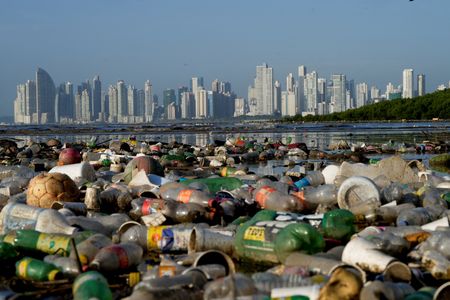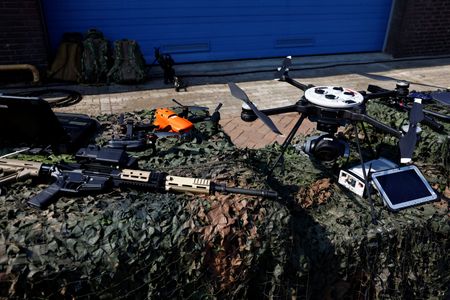By John Revill
ZURICH (Reuters) -Swiss watchmaker Swatch Group’s chief executive Nick Hayek has a tariff problem. And the clock is ticking.
U.S. President Donald Trump unleashed a 39% tariff on most Swiss-made products last week, which will come into effect on Thursday. The country – known for its luxury timepieces, chocolate and secretive banks – is racing to gain a reprieve.
Trump’s tariffs – aimed, he says, at erasing global trade imbalances – have rattled companies around the world and sparked scrambles to shift supply chains and sales channels by many brands – few more recognizable than Swatch, which became famous for its plastic watches.
The United States is the largest export market for Swiss watches.
Shares in Swiss watch and luxury firms, including Swatch, slid nearly 5% on Monday on news of the tariffs before paring back losses.
Swatch Group – the biggest Swiss watchmaker by sales volume – is trying to adapt, Hayek told Reuters. The company has front-loaded shipments to the United States, is tapping U.S. shoppers as they travel abroad, and has also raised its prices.
Part of the challenge for the industry is that Swiss watches need to be 60% made in the country, making it hard to shift production elsewhere.
“We produce everything in Switzerland, not in China. And we have a high cost. And when you add a 39% tariff, we cannot absorb that. So prices will go up for sure,” Hayek said on Monday, without giving specifics on the potential rise.
Swatch Group, which also owns Swiss luxury watch brands such as Omega, Tissot and Longines, already raised prices by 5% following Trump’s first tariff announcement in April.
Hayek explained that the firm had started to ship extra inventory to the United States earlier in the year when Trump’s initial salvo of global tariffs hit. Swiss watchmakers more broadly saw a spike in exports in April, trade data show.
“We shipped much more products to the United States, so this means there is not an immediate impact on us,” he said, adding that Swatch has at least three to six months of U.S. stock in warehouses and stores, giving a short-term buffer from tariffs.
The firm plans to ship “a little bit more” inventory over the next few days before the tariffs take effect.
Hayek said demand for its watches remained strong in the United States, for now.
Jean-Philippe Bertschy, an analyst at Bank Vontobel, a Zurich-based private bank, said higher inventory levels built up by watchmakers would give them breathing space only for the short term. Super premium watches could more easily pass on extra costs than mid-market and entry level ones, he said.
“The industry will be hoping and praying that the tariffs can be negotiated down to something like the 15% that Europe has,” Bertschy said. “If the 39% tariff remained, it would be devastating for the industry.”
The watchmaking industry is Switzerland’s third-largest export sector, behind chemicals and pharmaceuticals, and sales of machinery. It made up 9% of Swiss exports in 2024.
Swatch Group is the third-biggest Swiss watchmaker by revenue, after Rolex and Richemont, which makes IWC, Jaeger-LeCoultre and Cartier watches.
For watchmakers, a silver lining was the flexibility of sales channels for their portable products, which meant Swatch could target U.S. shoppers while they are overseas in tourist hot spots. “Customers are mobile,” Hayek said.
When China imposed luxury taxes, that simply drove Chinese consumers to shop in Macau and Hong Kong, he said.
“There are many possibilities for Americans. They travel all over the world,” said Hayek, pointing to options like shops aboard cruise ships. “They continue to buy even if you have to increase the prices in the United States.”
‘WHAT COUNTS IS WHAT TRUMP IS SAYING’
Nonetheless, Swatch is keen for the Swiss government to quickly strike a deal to avert the threatened 39% tariff.
Hayek called on Swiss President Karin Keller-Sutter to travel quickly to the United States to resolve the issue.
The tariff rate – one of the highest tariffs globally – could hit other Swiss luxury brands such as Rolex and Patek Philippe.
“The ‘Swiss-made’ label is part of our DNA. The history and expertise of our industry are unique worldwide,” Yves Bugmann, president of the Federation of the Swiss Watch Industry, said. “It is therefore inconceivable to abandon or dilute the label.”
The United States is the biggest foreign market for Swiss watches overall, accounting for 16.8% of exports worth about 4.4 billion Swiss francs ($5.44 billion), federation data show.
Bugmann said that the Swiss watchmaking sector had been investing in training in the United States as well as retail networks and services, adding the tariffs marked a “serious blow” that would indirectly hurt the U.S. economy.
Underscoring the volatile outlook, Georges Mari, co-owner of Zurich-based investment firm Rossier, Mari & Associates, which holds shares in Swatch, said it is “impossible” to forecast the impact on the industry.
“Tariffs can change at any moment due to the unpredictability of the Trump administration,” Mari said. The U.S. market generated 18% of Swatch Group’s sales in 2024, according to broker Jefferies.
Switzerland’s government said it was ready to make a “more attractive offer” in trade talks with Washington, after it held an extraordinary cabinet meeting on Monday to discuss its response to the tariff.
Swatch Group CEO Hayek said it wasn’t yet “doomsday” and hoped an agreement could be struck – though that was very much in the hands of the U.S. president.
“What counts on the U.S. side is what Mr. Trump is saying,” he said. “Nobody else.”
($1 = 0.8093 Swiss francs)
(Reporting by John Revill, Additional reporting by Helen Reid; Editing by Kirsten Donovan, Adam Jourdan and Joe Bavier)








